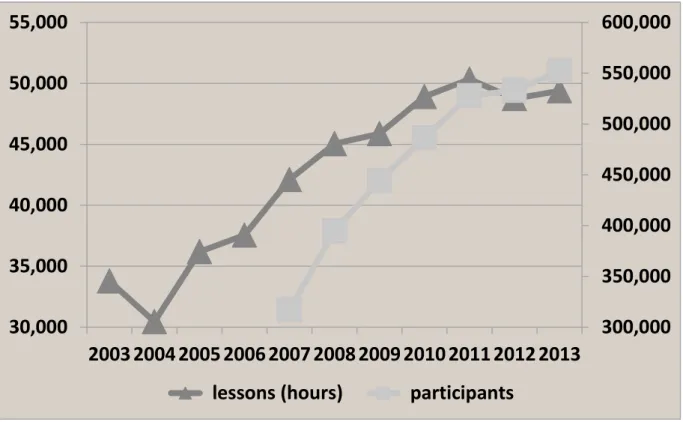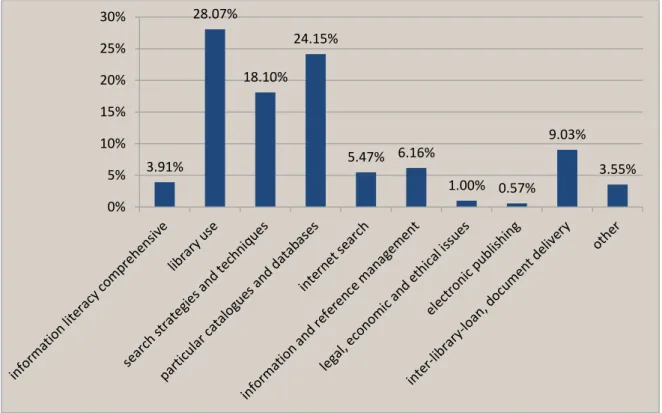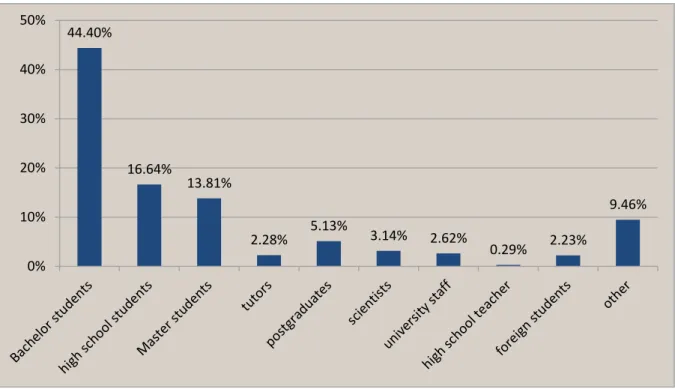Journal of Information Literacy
ISSN 1750-5968
Volume 8 Issue 2 December 2014
Project
Franke, F. and Sühl-Strohmenger, W. 2014. Teaching information literacy: the role of the university libraries in Germany. Journal of Information Literacy, 8(2), pp. 154-160.
http://dx.doi.org/10.11645/8.2.1958
Copyright for the article content resides with the authors, and copyright for the publication layout resides with the Chartered Institute of Library and
Information Professionals, Information Literacy Group. These Copyright holders have agreed that this article should be available on Open Access.
“By 'open access' to this literature, we mean its free availability on the public internet, permitting any users to read, download, copy, distribute, print, search, or link to the full texts of these articles, crawl them for indexing, pass them as data to software, or use them for any other lawful purpose, without financial, legal, or technical barriers other than those
inseparable from gaining access to the internet itself. The only constraint on reproduction and distribution, and the only role for copyright in this domain, should be to give authors control over the integrity of their work and the right to be properly acknowledged and cited.”
Chan, L. et al 2002. Budapest Open Access Initiative. New York: Open Society Institute.
Teaching information literacy: the role of university libraries in Germany
Dr. Fabian Franke, Director, Universitätsbibliothek Bamberg.
Email: fabian.franke@uni-bamberg.de
Dr. Wilfried Sühl-Strohmenger, Head of Library Systems and Teaching Librarian, Universitätsbibliothek Freiburg.
Email: suehl@ub.uni-freiburg.de
Abstract
The German Rectors’ Conference has recommended integrating information literacy (IL) courses into curricula and enhancing the role of libraries in order to create new information structures. This short report gives an overview of the IL activities of German university libraries. It analyses the results of the national IL statistics, presents the work of the IL networks in Germany and shows best practice at university libraries.
Keywords
information literacy, Germany, best practice, statistics, networks, frameworks, university libraries.
1. Information literacy in science and politics
Information literacy has become a major issue in many prominent papers, resolutions and recommendations of political and scientific panels in Germany. Three examples show the increased relevance of IL in the context of lifelong learning:
1. The German Bundestag’s Commission on Internet and Digital Society states significant shortfalls concerning the information competency of students and scientists. It explicitly asks for the teaching of IL in schools and universities (Deutscher Bundestag 2012).
2. The masterplan for Germany's information infrastructure by the Joint Science Conference recommends support for university libraries to teach IL to students and scientific staff (Kommission Zukunft der Informationsinfrastruktur 2011).
3. The German Rectors’ Conference points out an extended understanding of IL which includes data management and organisational processes
(Hochschulrektorenkonferenz 2012).
The catalyst for launching the activities and course programmes in many German university libraries was a nationwide survey, the SteFi-Studie, in 2001, supported by the German Ministry of Research and Technology (Klatt 2001).
2. IL statistics
German national library statistics (HBZ 2013) count IL lessons in terms of taught hours in university libraries since 2003 and participant numbers since 2007. Lessons increased from 33,784 hours in 2003 to 49,377 hours in 2013, the number of participating students from 317,053 in 2007 to 552,323 in 2013.
Figure 1: German library statistics: IL lessons in university libraries (left axis) and participants (right axis).
In order to describe in detail the IL courses, specific statistics with nine key figures have been developed: (Informations Kompetenz 2013)
length of time of the courses
number of participants
field of study/subject of the participants
course type
course topics
didactics/teaching methods
target group
deployed staff
curricular integration
300,000 350,000 400,000 450,000 500,000 550,000 600,000
30,000 35,000 40,000 45,000 50,000 55,000
2003 2004 2005 2006 2007 2008 2009 2010 2011 2012 2013
lessons (hours) participants
In 2013 most of the courses focused on library use and on particular catalogues and databases, but libraries also taught other topics such as general search strategies, internet search and search engines, information and reference management, electronic publishing, legal issues and ethical issues.
Figure 2: Topics of IL courses in 2013
About 60% of the participants were bachelors and masters students. However, high school students also constitute an important target group for university libraries. More than 20% of the library courses were aimed at high school students or teachers.
3.91%
28.07%
18.10%
24.15%
5.47% 6.16%
1.00% 0.57%
9.03%
3.55%
0%
5%
10%
15%
20%
25%
30%
Figure 3: Target groups for 2013 library courses
3. IL networks
Due to the federal structure of Germany, IL working groups were first launched in regional library networks from 2002. They support local librarians, co-ordinate best practice, organise professional training and publish standards and recommendations.
The main exchange and communication platform for German teaching librarians is the Informations Kompetenz website. The heart of this platform is a database, containing more than 1,000 concepts, presentations, sample exercises and IL courses supplied by libraries that can be downloaded and used without restrictions. The IL statistics (see Figure 2) are located on this website; furthermore standards, position papers, declarations and statements are collected and presented.
In 2012, the German Library Association (DBV) and the Association of German Librarians (VDB) founded the nationwide Commission for Information Literacy. Their tasks include:
Monitoring the IL activities of universities and high schools,
acting as central contact for politics, science and libraries,
initiating projects for piloting and evaluating IL programmes,
raising funding for the German IL platform,
organising conferences,
and supporting the integration of IL into the curricula of universities and high schools.
44.40%
16.64%
13.81%
2.28% 5.13%
3.14% 2.62%
0.29% 2.23%
9.46%
0%
10%
20%
30%
40%
50%
The Commission is organising a best practice competition and a round table in order to discuss how new roles such as data librarian can be integrated into the education and training of librarians.
4. Standards and best practice
In 2009 the German Library Association adopted five IL standards for students (Deutscher Bibliotheksverband 2009). These are based on the Information Literacy Competency Standards for Higher Education of the US Association of College and Research Libraries (ACRL). Each standard is specified by indicators which describe the corresponding competencies.
Best-practice examples of how German university libraries transform the standards into a wide range of services (Sühl-Strohmenger 2012a, Sühl-Strohmenger 2012b) include:
Courses for bachelors, masters and doctoral students,
courses with credit points within the curricula of the bachelors and masters degree programmes,
courses about web-based information management and publishing,
workshops about scientific writing and electronic publishing,
workshops for reference management (Endnote, Citavi, Reference Manager),
online-tutorials about search strategies and databases,
and complete online courses for the promotion of IL to university students.
In many German universities the IL courses are embedded in the curricula of the faculties or are part of introductory seminars for academic research and writing. Not only the academic subject librarians, but also staff members of the information services or staff in the faculty libraries, are involved in these courses and training programmes. In order to strengthen their teaching skills, special training and further education for librarians in the fields of didactics and teaching methods have been developed, often supported by the centres for teaching of the universities. As a result, teaching librarians are now widely recognised within the
faculties.
In order to obtain more information about the information needs of students and researchers some German university libraries conduct surveys (Kohl-Frey 2007, Sühl-Strohmenger 2011).
5. Conclusion and outlook
Achievements in the advancement of IL in German university libraries can be evaluated with the help of nationwide IL statistics which provide the most specific datasets in this field.
There are promising approaches towards a comprehensive understanding of IL within libraries, and also towards the integration of IL courses into university curricula, which has the backing of political and scientific committees in Germany.
References
Deutscher Bibliotheksverband. 2009. Standards der Informationskompetenz für Studierende.
Available at:
http://www.bibliotheksverband.de/fileadmin/user_upload/Kommissionen/Kom_Dienstleistung/
Publikationen/Standards_Infokompetenz_03.07.2009_endg.pdf [Accessed 11 November 2014].
Deutscher Bundestag. 2012. Sechster Zwischenbericht der Enquete-Kommission „Internet und digitale Gesellschaft“. Available at:
http://dipbt.bundestag.de/dip21/btd/17/120/1712029.pdf [Accessed 11 November 2014].
Hochschulbibliothekszentrum des Landes Nordrhein-Westfale (HBZ). 2013. Deutschen Bibliotheksstatistik Available at: http://www.hbz-nrw.de/angebote/dbs/ [Accessed 01 December 2014]
Hochschulrektorenkonferenz. 2012. Hochschulen im digitalen Zeitalter:
Informationskompetenz neu begreifen - Prozesse anders steuern. Available at:
http://www.hrk.de/fileadmin/redaktion/hrk/02-Dokumente/02-10-Publikationsdatenbank/Beitr- 2013-01_Informationskompetenz.pdf [Accessed 11 November 2014].
Informations Kompetenz. 2013. Veranstaltungsstatistik. Available at:
http://www.informationskompetenz.de/veranstaltungsstatistik/ [Accessed 01 December 2014]
Klatt, R. et al. 2001. Elektronische Information in der Hochschulausbildung: innovative Mediennutzung im Lernalltag der Hochschulen. Leske + Budrich, Opladen. Available at:
http://dx.doi.org/10.1007/978-3-322-93247-1 [Accessed 4 December 2014].
Kohl-Frey, O. 2007. Beyond the bachelor. Informationskompetenz für Anfänger und
Fortgeschrittene an der Universität Konstanz. Krauss-Leichert, Ute (ed.): Teaching Library – eine Kernaufgabe für Bibliotheken. Lang, Frankfurt a. M. et al., pp.149-169.
Kommission Zukunft der Informationsinfrastruktur. 2011. Gesamtkonzept für die Informationsinfrastruktur in Deutschland. Available at: http://www.leibniz-
gemeinschaft.de/fileadmin/user_upload/downloads/Infrastruktur/KII_Gesamtkonzept.pdf [Accessed 11 November 2014].
Sühl-Strohmenger, W. 2011. Informationskompetenz im Bachelor und im Masterstudium.
Befunde von Studierendenbefragungen (2008-2010) an der Universität Freiburg. B.I.T.online 14 (1), pp. 11-18.
Sühl-Strohmenger, W. (ed.) 2012a. Handbuch Informationskompetenz. De Gruyter, Berlin, Boston.
http://dx.doi.org/10.1515/9783110255188
Sühl-Strohmenger, W. 2012b. Teaching Library. De Gruyter, Berlin, Boston.


